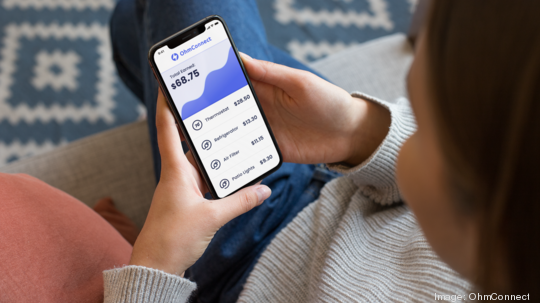
As I started my conversation with Cisco DeVries, the CEO of Oakland-based smart grid startup OhmConnect, massive wildfires were burning across the state and a recently released IPCC report found that the effects of climate change were already evident and accelerating.
Is there any sign of hope, I asked DeVries, who had spent the bulk of his career working in the sustainability space, including at the city of Berkeley where he helped pioneer the Property Assessed Clean Energy Program to help homeowners finance renewable energy projects.
Well, there's the refrigerator, he answered.
Better energy standards and engineering have made the ubiquitous appliance 75% more efficient, while also increasing its size and lowering the price, he explained, meaning billions of dollars saved for the American consumer and positive impacts for sustainability efforts.
"I think the refrigerator might have been my first true energy love because it is an example of the things that have gone right. There are more of them than we think or that are immediately obvious because when things go right, you don't really notice it," DeVries said.
That philosophy is central to how DeVries thinks about OhmConnect. The eight-year-old startup focuses on helping make it easier to conserve energy through smart devices, particularly in times of high stress on the power grid, which leads to utilities turning on fast-acting power plants relying on fossil fuels.
He points to the example seen last August when a sweltering California heat wave led to the first statewide power outages in decades. This risk, he says, is one of the major barriers in decarbonizing our power grid. During that crisis, DeVries said OhmConnect was able to reduce a gigawatt hour of energy use over a number of days, equivalent to the entire city of San Francisco going offline for more than an hour.
OhmConnect's solution relies on a system that notifies people to use less energy during what it calls "OhmHours" and pays rewards (including gift cards, charitable donations and cash prizes) that correspond to the level of energy savings. If smart devices are linked to the OhmConnect system they can automatically power down when necessary for even greater savings. The company, which is linked with the state's major utilities, including PG&E and SoCal Edison, says it has paid out around $15 million in total rewards.
The 77-person startup can aggregate these energy savings across its more than 180,000 users in California, and it earns revenue by selling those energy savings on the wholesale electricity market.

In a way, the company's model is an evolution to the flex alerts sent out by agencies during the summer months pleading with people to save power.
"My job would be easy if I could guilt trip people into doing it. Turns out guilt will get people to tell you they're going to do it, but they won't," DeVries said. "However what we have found is that if you align people's economic incentives and give them enough of the understanding of what's happening and why it matters, then that works."
With the help of $100 million of investment from Alphabet spinout Sidewalk Infrastructure Partners, the company is currently in the midst of building what it calls a virtual power plant dubbed "Resi-Station." Of that funding, $80 million is going go toward giving away hundreds of thousands of smart home devices in order to build up the company's fleet of connected users and scale up to 550 megawatts over the next two or three years. The other $20 million was in the form of equity, bringing the company's total amount raised to nearly $30 million.
"It has given our customers not only the opportunity to make more rewards with us, but also to improve their lives in other ways that are just like happy byproducts of these thermostats," DeVries said. "In the last two years, we are close to tripling the number of appliances and devices that we control."
Having that network of connected devices allows the company to flex power for a few minutes or an hour automatically and at scale to meet the demand from the grid. The vast majority of the OhmConnect's users are in California, but the company has started to expand to regions that are seeing similar challenges, including Australia and Texas.
Even with the company's steady growth, the question remains: Will it be enough?
DeVries related a conversation he had with a senior official helping to run California's power grid where he was touting OhmConnect's growth and recent milestones.
"He just looked at me and was like, 'How do you go 60 times faster, because I need you to do that. We can't wait,'" DeVries said. "Even with all this exciting momentum and growth we're having, the need is exponentially bigger. At a minimum, I want to double what we're doing. I want to keep growing. I want to be able to pay $10 million dollars to our users next year instead of five. But I think the bar just moved, I think success is different, I think we need to figure out how to do this much more quickly."







